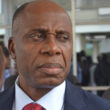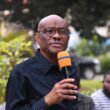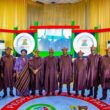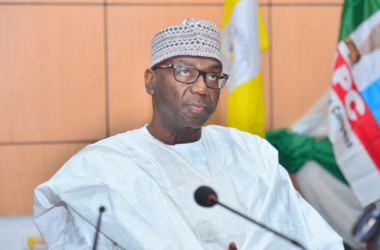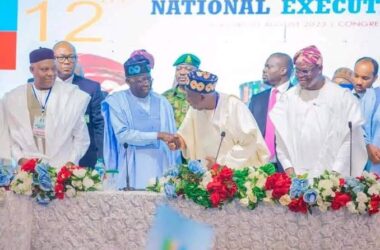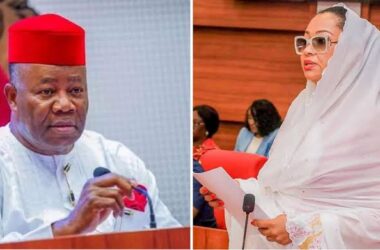There are speculations that promises allegedly made by the Presidency and the national leadership of the All Progressives Congress (APC) are contributing to a wave of defections from opposition parties.
According to Daily Trust, many lawmakers, senior elected officials, and party leaders from other political parties have been leaving their original parties to join the ruling APC. While some give internal conflicts or dissatisfaction with their party’s performance as reasons, sources reveal other factors at play.
Political defections have always been part of Nigeria’s political landscape, but the recent speed and volume of defections to the APC, occurring less than two years into President Bola Ahmed Tinubu’s administration, have caused concern among political observers.
The country is facing tough economic and security challenges, which some believed would unite opposition forces rather than cause more divisions.
Many of those who have switched to the APC say they left their former parties because of internal struggles or poor performance. However, multiple sources reveal that there are also other strong incentives offered, such as automatic tickets to run in elections and lucrative contracts, which make the APC more attractive.
A Surge in Defections
Since President Tinubu assumed office, the ruling APC has seen an influx of politicians from rival parties. Although defections are common, the scale at which opposition members are moving to the APC is unprecedented in recent Nigerian history. This has raised questions about the true motivations behind these moves, especially at a time when Nigeria is dealing with worsening economic conditions and a fragile security situation.
The removal of fuel subsidies by the current administration and the subsequent fall of the naira have deepened economic hardships for many Nigerians. These conditions were expected to encourage opposition parties to form stronger coalitions to challenge the ruling party in the upcoming 2027 elections. Instead, the opposite is happening. Opposition parties appear weakened as many of their members join the APC.
The Social Democratic Party (SDP) has been talked about as a potential platform for opposition coalition efforts, with the former Kaduna State governor Nasir El-Rufai being one of the few politicians to leave the APC for the SDP. But the ruling party has mostly benefited from defections, attracting members from the Peoples Democratic Party (PDP) and other smaller parties.
The wave of defections cuts across different levels of political leadership. Several serving governors have switched allegiance to the APC, along with a growing number of legislators both at the national and state levels. Former governors, deputy governors, and even political leaders without current offices are moving to the ruling party.
According to sources close to the situation, the APC has been actively wooing politicians with promises and benefits to increase its strength ahead of the 2027 general elections. Some defectors have reportedly been offered guaranteed candidacies for the next elections, regardless of their past political performance or seniority.
Financial Incentives and Promises
One of the main factors cited by insiders is the alleged use of money to attract opposition politicians. Reports say that large sums of money are being distributed, particularly among senators and members of the House of Representatives, to encourage them to join the APC. The offers reportedly include multi-billion naira projects for their constituencies and promises of automatic tickets to contest future elections.
Besides lawmakers, influential political figures who do not currently hold elective or appointed positions are also being targeted with financial rewards. These individuals often have strong influence in their regions or constituencies and their defection can bring many followers to the ruling party.
Despite these allegations, the Presidency, APC leaders, and politicians who have defected have denied any wrongdoing. They insist that defections are driven by genuine dissatisfaction with opposition parties, which they describe as being plagued by internal crises.
Automatic Tickets
Sources say that many legislators who switched to the APC were assured they would get automatic tickets to contest the 2027 elections. This means they would not face competition from within the party for nomination, no matter their performance in office or length of service. Such offers are seen as a strong pull factor.
For first-time governors from opposition parties, similar assurances appear to have been made. So far, Sheriff Oborevwori of Delta State is the only first-term governor who has publicly left the PDP to join the APC after being elected under the opposition platform in 2023.
Other first-term governors from different parties — including Alex Otti (Labour Party, Abia), Umo Eno (PDP, Akwa Ibom), Peter Mba (PDP, Enugu), Abba Kabir Yusuf (NNPP, Kano), Caleb Mutfwang (PDP, Plateau), Siminalayi Fubara (PDP, Rivers), Agbu Kefas (PDP, Taraba), and Dauda Lawal (PDP, Zamfara) — have not yet made official moves but some appear to be leaning toward the ruling party.
Legislators and Constituency Projects
In addition to promises of election tickets, it is alleged that many lawmakers are being wooed with multi-billion naira constituency projects. These projects often involve infrastructure development such as roads, schools, or healthcare facilities in their home states.
Senator Kawu Sumaila of Kano South, a recent defector from the New Nigeria People’s Party (NNPP) to the APC, was linked to a N90 billion project aimed at rehabilitating dams in his senatorial district. This project is said to have been one of the incentives for his defection.
When Daily Trust spoke with him, Senator Sumaila confirmed the existence of the project but clarified that the contract was awarded before his defection to the APC. He rejected the claim that his move was conditional on receiving the contract.
“We influenced it (the constituency project) for our people. I am not a journalist. I am a representative of the people. I made promises during my campaign—one of them being to revitalise the agricultural and irrigation systems in Kano South,” he said.
Sumaila explained that Kano South has three major dams, including Tiga and Challawa, which are among the largest in West Africa. These dams support irrigation not only in Kano but also parts of neighbouring states like Yobe, Bauchi, and Borno.
“Challawa dam in Karaye has been idle for 34 to 35 years after its completion. Reactivating it would impact at least 30,000 people,” he added.
The scale of defections to the APC has significant implications for Nigeria’s political future. The ruling party is consolidating its power by absorbing members from opposition parties, which weakens the opposition’s ability to provide effective checks and balances.
Critics argue that such mass defections, driven partly by financial incentives and guaranteed election tickets, undermine the democratic process. They worry that politicians are motivated more by personal gain than by serving the interests of the people.
At a time when Nigeria faces serious challenges—economic hardship, rising inflation, insecurity, and growing dissatisfaction with governance—the opposition was expected to unite and offer a viable alternative. Instead, the ruling party is expanding its dominance by attracting defectors.
This political shift could affect the outcome of the 2027 general elections. With more politicians joining the APC, the ruling party is likely to have a strong advantage in terms of numbers and influence.


